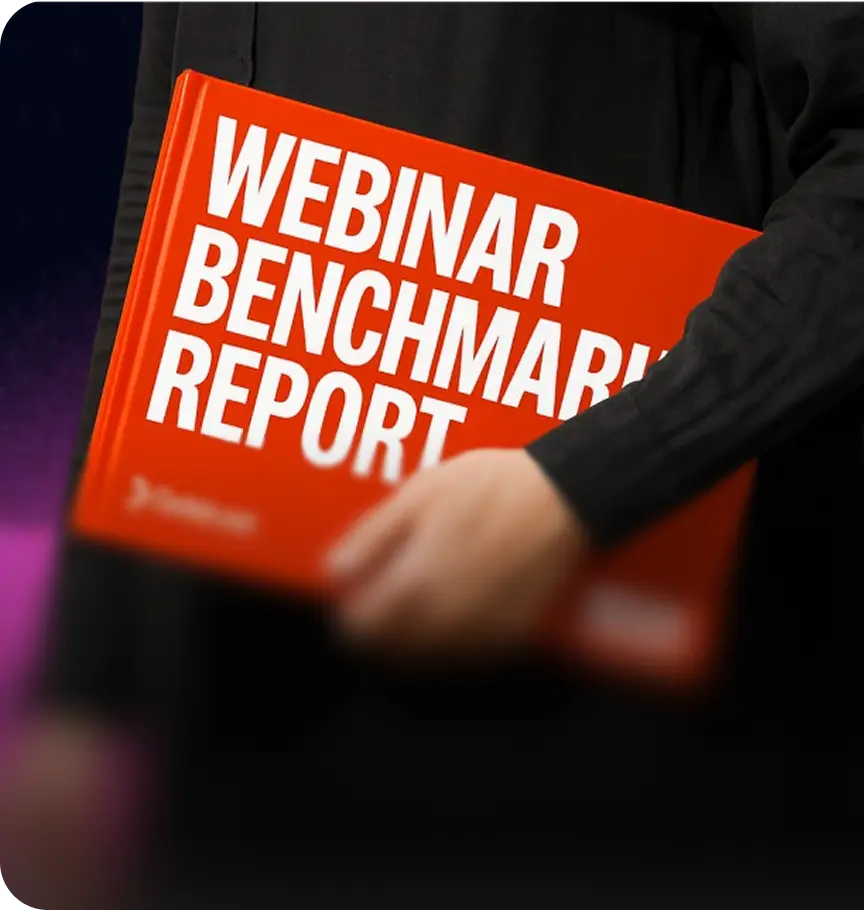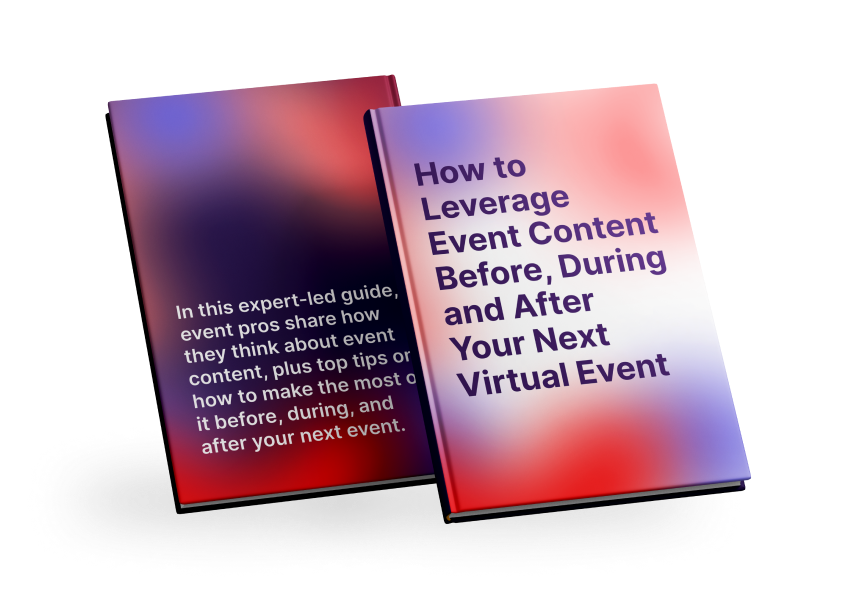How to Leverage Event Content Before, During and After Your Next Virtual Event
In this expert-led guide, event pros share how they think about event content, plus top tips on how to make the most of it before, during, and after your next event.
As an event marketing ace, you’ve likely heard Bill Gates’ spot-on marketing statement: “Content is king.” Kudos to Bill, any top-notch event marketer would have to agree — especially in an age where making, accessing and sharing content is easier than ever before. But getting buy-in to spend on live performances and big-name speakers isn’t quite so easy. If you want that budget, you’re going to have to prove those extra zeros are worth their weight. Because, let’s face it. With the majority of in-person events cancelled or on hold, event marketers are more reliant on content than ever before. But how do you choose the best theme for your event? And how can you maximize your content to increase ROI before, during and after the event? We asked three leading event marketing experts to give us the lowdown.
What we’ll cover:
The real ROI of virtual event content Choosing the right theme for your virtual event Virtual event content before the big day Virtual event content during your event Virtual event content after the event
Looking to elevate your virtual events?
Discover why Goldcast is a leader in producing highly branded and engaging B2B digital events.
The real ROI of virtual event content
While content marketing has been around since the 19th Century, it’s only with the dawn of digital that it’s found itself at the epicenter of all killer marketing strategies. But proving ROI on event content isn’t always as simple as money out, money in. You have to look at the bigger picture. And that means showcasing how virtual event content can affect every part of the sales cycle to accelerate conversions. To get you started, look out for these revenue-boosting event content benefits:
- Audience interaction: Sharing great content on your social channels helps increase engagement and keep your audience coming back for more.
- Increase brand awareness: Creating content that serves your customer’s needs helps position your brand as a trusted thought leader.
- Drive traffic: Ensure your content is SEO-optimized to maximize your reach.
- Boost lead gen and conversion: Use content viewing insights to capture relevant leads and create personalized sales strategies.
Now that we’re clear on some of the measurable benefits your event content can bring to the table, you’re ready to get cracking. And for our experts, there’s only one place to start: Your theme.
Choosing the right theme for your virtual event
No two ways about it, the theme you choose for your virtual event content is crucial. Get it right and you’ll be on your way to epic event success. Get it wrong and trust those attendance numbers will take a hit. Our marketing experts think it’s a pretty big deal too. In fact, for Kustomer’s Director of Marketing Events, Stacey Dolchin, the event theme is priority number one.
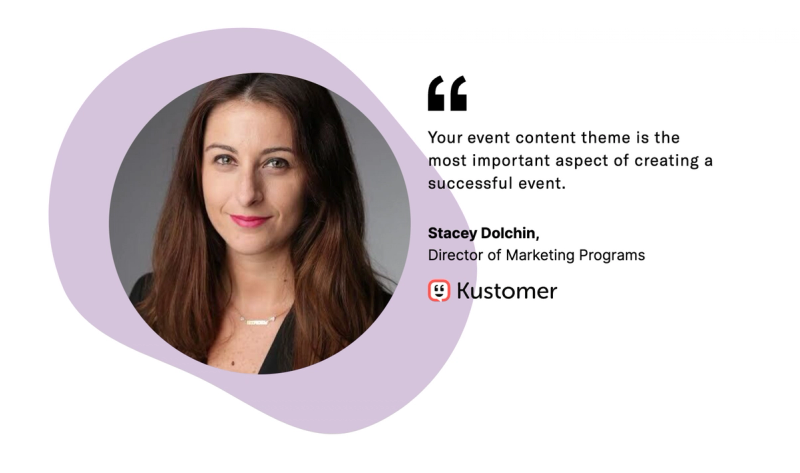
But choosing a theme that wows your audience and helps your revenue soar isn’t always easy. Let’s make it easier with these top tips.
#1: Pinpoint the pain point
Customers in 2021 are smart — they know when they’re being sold to. That makes your job as an event marketer way more tricky. When it comes to choosing a theme for your virtual event content, it can’t be all about you. In fact, it shouldn't be about you at all. (Well, at least, not overtly.) Instead of focusing on what you can sell, ask what problem you can solve. For Josh King, Sales and Marketing Director at full service event agency emc3, putting the audience first is the best possible way to find a meaningful theme for your event.
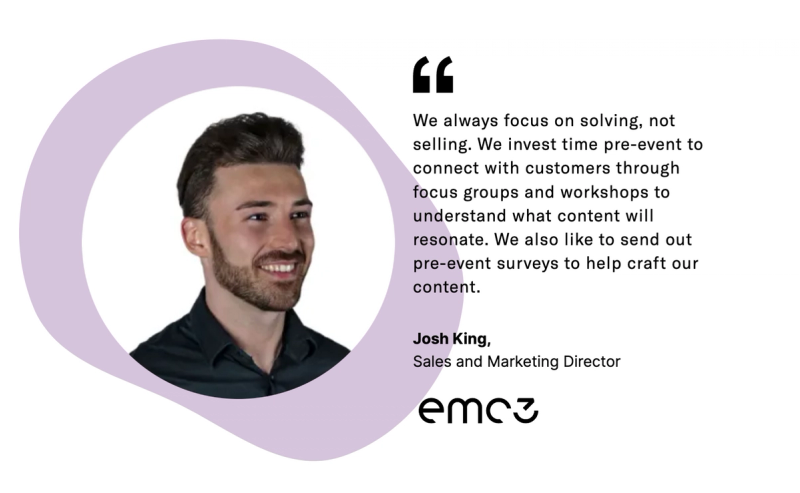
But choosing a theme that wows your audience and helps your revenue soar isn’t always easy. Let’s make it easier with these top tips.
“When customers feel listened to, their experience and your ROI go through the roof!”
#2: Do your research
But experts like Josh also know that connecting with customers before an event isn’t the only way to play it. What else can you do? Roll up your sleeves and dive into your data.
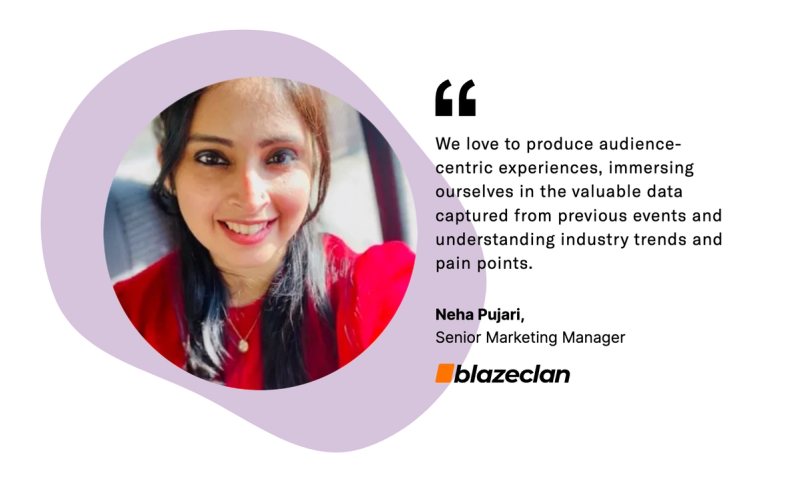
And Blazeclan Technologies’ Senior Marketing Manager, Neha Pujari, agrees. She suggests splitting your research into two core areas:
- Internal communication: Take an ABM approach and work with the sales team to discover what conversations they’re having with your customers.
- Wider trends: Review movements within your industry to learn the interests of your target audience. Then work backwards to find a strong case study.
Neha explains that “The pandemic forced enterprises to prioritize cloud adoption and implementations, at the expense of optimization. This meant higher costs”. After doing her market research and speaking directly with customers, she realized this had to be the theme for her next virtual event.
“We organized two closed-door virtual roundtables with industry leaders. Our audience joined to exchange perspectives on the value delivered by key optimization activities and the challenges with when and where to apply them.”
#3: Make it relevant
While it’s a nice idea to focus solely on your customers and what’s going on in the industry, if neither of those have anything to do with your product, your event content is going to serve zero purpose. For Stacey, this is where you have to master the balancing act — juggling customer needs and company goals.
“Basing your virtual event content on an industry trend, backed by your product offering, means more interest, more registrations, more attendees, more interactions, more questions and, ultimately, more leads.”
And by positioning your product as a relevant solution to a current topic, Stacey says your brand gains somes serious bonus points.
“Use virtual event content to establish your brand as a thought leader. So when a prospect is finally in the market for your service, they’ll remember the insights you provided and relate it to your product offering.”
Once you’ve found a topic that’s current and has a natural synchronicity with your product, it’s safe to say you’re onto a winner. Next, let's find out how you can utilize your perfectly aligned event content before, during and after the event.
Virtual event content before the big day
Awesome content shouldn’t be a one-use wonder. With the right virtual event platform, you can record entire sessions and export them to use as snippets for pre-event email campaigns, social media posts or SEO pieces for your website. When it comes to virtual events, build-up will make or break you. So your content has to be on-point if it’s going to stand out in the sea of invites clogging your customers’ inboxes. For Neha, pre-event content should be split into event-themed content and speaker-driven content. And the aim of both is to achieve these three goals: 1. Generate brand awareness 2. Drive registrations 3. Build anticipation Whether it’s targeted email campaigns, ads, social media or blogging — experts like Josh believe the best way to market your event content and achieve these goals is to use every lever possible. Check out Josh’s 15 pre-event content must-haves below!
Pre-event Promotion 101 ✅
Promotional videos
Speaker teasers
Session announcements
Ask partners to promote your event
Event infographics
Pre-event blogs
Pre-event podcasts
Pre-event survey
Press releases
Influencer and micro-influencer marketing program
Brand ambassadors program
LinkedIn Live promotion
Paid advertisements
Pre-event competitions
Community Slack channel or LinkedIn group
If you’re only leveraging your content during your event, you’re missing a trick!
Virtual event content during your event
On the big day, it’s all about positioning your content to deliver the experience promised. Choosing the right virtual event platform to take your content ‘meh’ to ‘wow’ is going to be crucial to the way your audience consumes and engages with your brand. Problem is, there are a bunch of options to choose from — and often, it’s pretty tricky to set them apart. So what should you look out for? Supported content options. And lots of them.
A Masterclass on Content Creation by Smartling 🙌🏻
Worldwide brand and communications legend, Adrian Cohn, had one focus for his virtual event:
“To create great content and make it feel like a Netflix stream.”
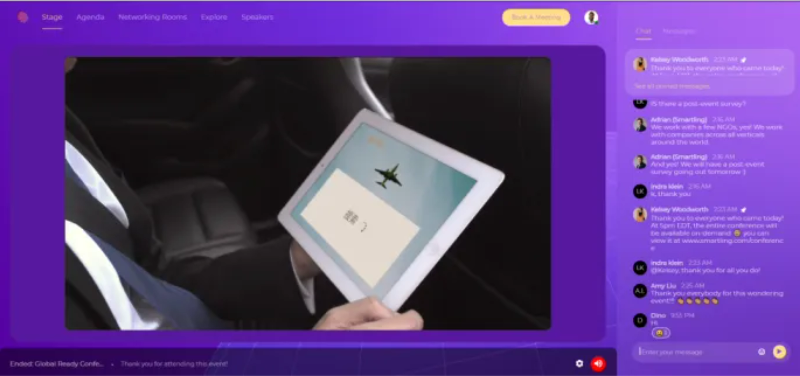
With 42% live attendance and an average user visit time of 112 minutes, it’s safe to say he smashed it. The key to Adrian’s success? Mixing it up with awesome, Netflix-worthy, content options, including:
- Stage loop: Repurpose material from previous events to greet attendees with an awesome, content-rich experience from the minute they enter.
- Pre-recorded video: Minimize risk by pre-recording sessions, uploading them to the platform and setting them to auto-play on demand.
- Live sessions: Hire real-life rockstars to play a live set and speak directly to your audience. Music not your thing? Try an artist, author or actor!
- Podcast snippets: Don’t reinvent the wheel. If you have awesome content, repurpose it to make your event even more content rich.
- Content hub: Share resources your customers will love. Then, create epic personalized follow-ups with account-level data on who downloaded what.
- Demo your product: Set up a booth and showcase your product organically.
“We took other content that we made and recycled it. With Goldcast, you’re immediately stimulated with content.”
Clearly, there’s no shortage of ways to optimize your content on the big day. But what about all those registrations that didn’t show up? For Neha at Blazeclan, her focus for content creation is divided into two categories.
"Our aim during the event day is to generate content that will engage our attendees and appeal to our followers who aren't at the actual event."
How does she get that unmissable content out to those who couldn’t make it? That’s where the post-event content drive comes in.
Virtual event content after the event
By now, you’ve put in some serious work to produce and promote your event content. And experts like Stacey from Kustomer believe that content deserves to be seen by everyone.
“As many people as possible need to see this content — use it all! From a key takeaway blog post, to pull quotes and soundbytes for social media, to exclusive downloadable e-books.”
And Neha agrees, with post-event content being a major priority at Blazeclan.
“Post-event content is highly critical to build on the event momentum and capitalize on brand awareness. We do this through thank you emails and nurture campaigns that contain wrap-up blog posts and highlight videos with attendee testimonials.”
But the work doesn’t stop there, especially not for Josh King. This marketing extraordinaire takes post-event strategy to level 💯. And we’re so here for it.
Josh King’s Top 10 Post-Event Content Tips
- Post-event email campaign with links to specific sessions and content
- Create a sizzle reel or recap videos
- Share data from event polls
- Share fun stats about the event
- Create post-event blogs and infographics
- Share a gallery of tweets from the event hashtag
- Photos and/or a photo booth gallery
- Share a music playlist from your event
- Post-event podcasts
- Post-event survey to ensure audience satisfaction and improve future events
Take Josh’s advice—invest time interpreting Goldcast’s awesome virtual event data. Understand what stage each account is at within the buyer journey through content insights and align with sales to develop impactful strategies to nurture leads.
“There’s an art to producing amazing content: Be brave. Be bold. Be original.”
Josh couldn’t have said it better. Mastering virtual event content is an art form.
But with conversion rates up to 6X higher for content marketing users, it’s one worth prioritizing.
With these exclusive insights from our trusted event content connoisseurs, you’re well on your way to securing that buy-in and acing your event ROI. Whether it’s executing an awesome promotion strategy, creating out-of-this world event content experiences, or crafting personalized follow-ups your prospects will actually appreciate — with the right platform, you can leverage your event content and achieve it all.
Ready to deliver a truly unforgettable virtual event experience?
Discover why Goldcast is the B2B digital events platform of choice for brands like Adobe, Microsoft, Zuora, and Mailchimp.
Stay In Touch
Platform
Resources
© 2025 Copyright Goldcast, Inc. All rights reserved.



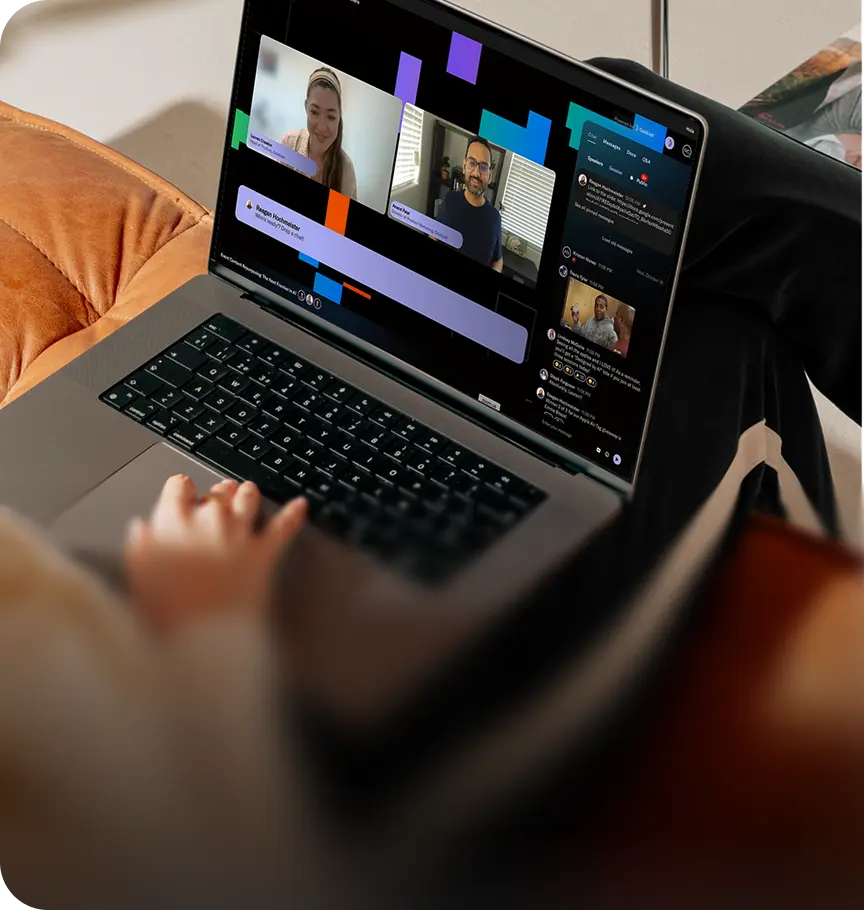

 Upcoming Events
Upcoming Events Event Series
Event Series On-Demand Events
On-Demand Events